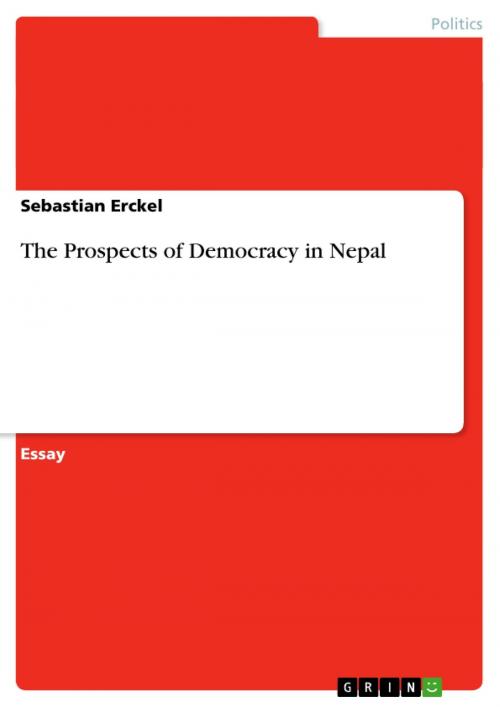The Prospects of Democracy in Nepal
Nonfiction, Social & Cultural Studies, Political Science, International, International Relations| Author: | Sebastian Erckel | ISBN: | 9783640326921 |
| Publisher: | GRIN Publishing | Publication: | May 11, 2009 |
| Imprint: | GRIN Publishing | Language: | English |
| Author: | Sebastian Erckel |
| ISBN: | 9783640326921 |
| Publisher: | GRIN Publishing |
| Publication: | May 11, 2009 |
| Imprint: | GRIN Publishing |
| Language: | English |
Essay from the year 2008 in the subject Politics - International Politics - Region: South Asia, grade: good, University of Kerala (Department of Political Science), course: Politics of South Asia, language: English, abstract: This essay analyses the chances for democracy in Nepal after the declaration of the Republic of Nepal. This is done by examining earlier experiments with democracy and the reasons for their failure. The main actors of Nepali politics, namely the so- called democratic parties (Nepali Congress and the Left), the Monarchy and the Maoists, receive special attention. South Asia is widely considered to be one of the most volatile regions in the world. In the roughly 60 years since the end of the colonial era the region has witnessed almost all possible types of internal and external conflicts- from wars between states to military takeovers, ethnic insurgencies and social uprisings. While every country was affected, the distinct geographical and cultural features of South Asia contributed to a dangerous interrelatedness of these conflicts. The situation has become even more threatening after both India and Pakistan successfully tested nuclear weapons in 1998. However, the year 2008 has seen some remarkable developments in South Asia that give reason to look at least cautiously optimistic into the future. In Pakistan, elections marked the return to civilian rule, Bhutan experienced its first elections ever, and in Nepal a Constituent Assembly was elected that shortly afterwards abolished the world's last Hindu monarchy by declaring the country a federal and secular republic. Furthermore, the caretaker government in Bangladesh has announced its plans to hold elections at the end of the year. Nonetheless, history indicates that a reversal of these developments cannot be ruled out. It is therefore necessary to evaluate the prospects of democratisation in the light of past events. This paper attempts to assess the chances of a successful democratisation process in Nepal on the basis of an analysis of the factors responsible for the failure of democracy in the past.
Essay from the year 2008 in the subject Politics - International Politics - Region: South Asia, grade: good, University of Kerala (Department of Political Science), course: Politics of South Asia, language: English, abstract: This essay analyses the chances for democracy in Nepal after the declaration of the Republic of Nepal. This is done by examining earlier experiments with democracy and the reasons for their failure. The main actors of Nepali politics, namely the so- called democratic parties (Nepali Congress and the Left), the Monarchy and the Maoists, receive special attention. South Asia is widely considered to be one of the most volatile regions in the world. In the roughly 60 years since the end of the colonial era the region has witnessed almost all possible types of internal and external conflicts- from wars between states to military takeovers, ethnic insurgencies and social uprisings. While every country was affected, the distinct geographical and cultural features of South Asia contributed to a dangerous interrelatedness of these conflicts. The situation has become even more threatening after both India and Pakistan successfully tested nuclear weapons in 1998. However, the year 2008 has seen some remarkable developments in South Asia that give reason to look at least cautiously optimistic into the future. In Pakistan, elections marked the return to civilian rule, Bhutan experienced its first elections ever, and in Nepal a Constituent Assembly was elected that shortly afterwards abolished the world's last Hindu monarchy by declaring the country a federal and secular republic. Furthermore, the caretaker government in Bangladesh has announced its plans to hold elections at the end of the year. Nonetheless, history indicates that a reversal of these developments cannot be ruled out. It is therefore necessary to evaluate the prospects of democratisation in the light of past events. This paper attempts to assess the chances of a successful democratisation process in Nepal on the basis of an analysis of the factors responsible for the failure of democracy in the past.


![Cover of the book The basics of teamwork [Hausarbeit plus Präsentation] by Sebastian Erckel](https://www.kuoky.com/images/2003/april/300x300/9783638181020-HqTK_300x.jpg)












